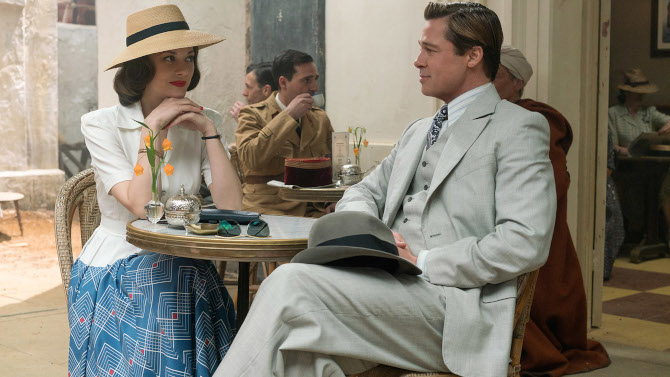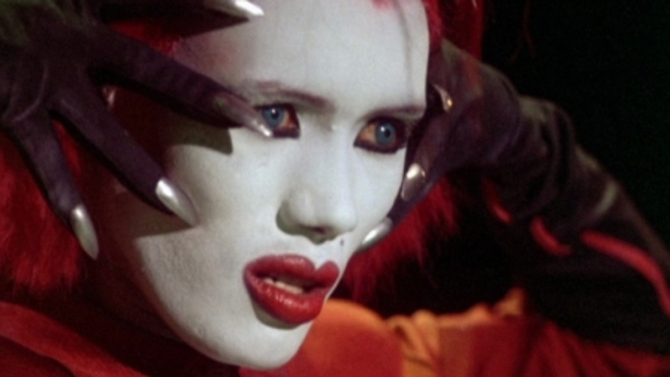
Déjà vu Dalliance
Channeling the mesmeric movies churned out by the studio system back in the 1930s and 40s, Allied (2016), directed by Robert Zemeckis, channels the likes of Morocco, Casablanca, Across the Pacific, Gilda, To Have and Have Not, and numerous others – attempting to find a spark from the classic themes of melodrama, romance, suspense and the epic nature of the annals of the cinematic past, with quite successful results. Set the year Casablanca and Across the Pacific were released – 1942, the story in fact starts in Morocco, with recently parachuted in Canadian spy Max Vatan (Brad Pitt) meeting up with another undercover agent, Marianne Beauséjour (Marion Cotillard), who will be pretending to be his wife.
-

Flying the Nest
Lady BirdDecember 10, 2017Indie darling Greta Gerwig makes her solo writing/directorial debut with Lady Bird, a coming of age film that has been building strongly towards the 2017-2018 Awards season. . . earning an almost unheard of rating of 100% on Rotten Tomatoes. Many of the plot points will sound familiar when it comes to a coming of age tale – teen angst, strife between mother and daughter, obsession with sex and losing your virginity, first love, applying for colleges, joining the school theatre club, crushes on teachers and other such things; though, it is not these things that are truly important, but rather the honest, realistic voice in which it is told.
-

Car Wars
Dead End Drive-InOctober 27, 2017Come with me, and you’ll be, in a world of pure Ozploitation. Had you going there, didn’t I?. . . you thought I was going full Willy Wonka, but rather, I am transporting you to a very different landscape, that of the Australian exploitation film. Growing out of the R rating after it was instituted (as well as helped by new tax cuts), this Australian New Wave rose out of the 1970s and 80s (a little later than its American counterpart), and is a broad term that refers to no specific genre, encompassing horror, comedy, sexploitation, post-apocalyptic, dystopic and so much more – though it does slant the traditional norms of culture at the time. It is hard to argue that the Mad Max franchise, directed by George Miller, would not be the best known example of this type of movie.
-

In a Flash
PolaroidOctober 20, 2017Imagine being wakened by a bright light, not like that of some sort of alien abduction, but rather as if someone was snapping your photo, with the flash on, in the pitch black of your own bedroom. . . well, that is the concept of the 2015 short film Polaroid. Produced, directed, filmed and edited by Alex “Pressplay” Wohleber, it is a vignette of sheer terror. Waking from the bright light and distinct sound of a Polaroid picture being taken, our lead, simply known as Guy (Matt Halpern – also a producer), not only finds himself in a possible robbery situation, but also quickly learns that the electricity in his home isn’t working.
-

Strip Poker
VampOctober 15, 2017It is likely that this sounds familiar: a movie about a group of people who enter an unusual strip club that ends up being packed with vampires – I would fashion a guess that most film afficionado’s would immediately point to the now iconic Quentin Tarantino penned (and executive produced), Robert Rodriguez directed 1996 horror feature From Dusk Till Dawn. . . though this concept was actually first done a decade earlier in the 1986 horror comedy Vamp. Producer Donald P. Borchers came up with a simple idea, ‘vampire strippers’, and decided to take it to a young filmmaker with only one well respected short film to his name – Dracula Bites the Big Apple, Richard Wenk (now a well respected screenwriter who has penned such films as 16 Blocks, The Equalizer, the remake of The Magnificent Seven and Jack Reacher: Never Go Back), who expanded the idea and took on the role of director as well.
-

CAUTION: Help Needed
Punch BagSeptember 24, 2017Human nature is fickle. For all the good things that come with it, there is a belief, even a drive, to be right. Perhaps best termed a stubborn streak, we feel that we alone can have the appropriate perspective on an issue, leading to countless gripes between neighbours or amongst family members. It is likely that, if we travelled back two thousand years, Ancient Romans would be having similar tiffs in which both believe they are in the right. It is this scenario that comes to life in the absurdist 2017 short film Punch Bag, a dark comedy with a unique vision. Written and directed by Daniel Harding, the narrative follows Naomi (Ingvild Deila), a woman who finds herself in one such similar situation, disgruntled with the intrusive noise of her neighbours. Finding a striking yellow and red pamphlet that offers aid for such matters, she waits outside the business office, growing more hesitant to enter after hearing the lopsided row going on inside.
-

Are You Afraid of the Dark?
Lights OutSeptember 10, 2017A wonderful feel-good story, Swedish director Davis F. Sandberg, now known for his 2016 full length feature debut Lights Out and the currently-in-theatres horror prequel Annabelle: Creation, started as an animator and documentary/short filmmaker. In a dangerous amount of debt back in 2013, he wrote and directed a short film titled, perhaps you’ve guessed it, Lights Out. Released at the Bloody Cuts Horror Challenge Film Festival, it made it to the finals, and won Sandberg the Best Director award. Then, the power of the Internet kicked in, and Lights Out shot from thousands of views to millions – and Hollywood higher ups came scrambling. The man, formerly in financial difficulties, has now become a name to watch in this recent renaissance of the horror genre out of Tinseltown.
